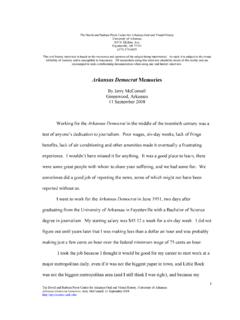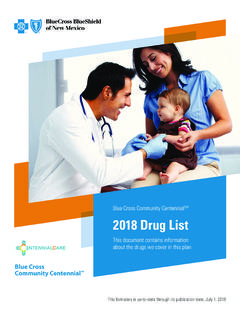Transcription of Bumpers College Oral History Centennial Project
1 Pryor Center for Arkansas Oral and Visual History , Special Collections, University of Arkansas Libraries Bumpers College Centennial Project , David Andrews interview, 7 October 2005 1 Pryor Center for Arkansas Oral and Visual History Special Collections Department University of Arkansas Libraries 365 N. McIlroy Ave. Fayetteville, AR 72701 (479) 575-5330 This oral History interview is based on the memories and opinions of the subject being interviewed. As such, it is subject to the innate fallibility of memory and is susceptible to inaccuracy. All researchers using this interview should be aware of this reality and are encouraged to seek corroborating documentation when using any oral History interview.
2 Bumpers College Oral History Centennial Project Interview with David Andrews Fayetteville, Arkansas 7 October 2005 Interviewer: Teddy Morelock Morelock: Today we re visiting with Dr. David Andrews, who is emeritus professor of poultry science here at the University of Arkansas [Fayetteville]. David, you were born in Northwest Arkansas, is that correct? Andrews: Yes, I was born in Rogers, Arkansas, on a farm about three miles north of Rogers. TM: So, you went to high school at Rogers? DA: Yes, I went to Avoca School for six years and then went to Rogers seventh grade through twelfth grade. TM: You said you grew up on a farm. What type of farm? Was it poultry or livestock or.
3 ? DA: Well, we called it a poultry and livestock farm, I guess you d say and apples. We had about fifteen acres of apples, and that was our main work. It would be Pryor Center for Arkansas Oral and Visual History , Special Collections, University of Arkansas Libraries Bumpers College Centennial Project , David Andrews interview, 7 October 2005 2 all summer. Spraying them and so forth. And we had around nine or ten head of cows we d milk, and we had chickens. We had a flock of white leghorns. Early, my granddad had brown leghorns, then went into white leghorns, and my dad trap-nested them and selected them. He sold stock all over the United States. TM: So you more or less wound up in the business that your family was in, though, working with the breeding?
4 DA: That s true. TM: Were you the first person in your family to attend the university or to go to College ? DA: Yes, I was. My brother was two years older than I was. When he graduated in 1939, he went to a business College . When he finished that he went to Washington DC and worked in Washington DC. I was the first one to attend the university. TM: I assume you majored in animal science when you started the university. DA: When I first started, I guess, I could have been animal science or just of general agriculture, but I had in mind to be a vocational agri[culture] instructor, and when I got close to graduation, I talked to Professor Smith. He d been there a long time. He was in poultry at that time, and he encouraged me to get into poultry, so I got a Master s in poultry under him.
5 From there on it was poultry and poultry genetics. TM: So your undergraduate was probably just a general Ag[riculture] major, which was pretty much what everyone majored in back then, I think. Pryor Center for Arkansas Oral and Visual History , Special Collections, University of Arkansas Libraries Bumpers College Centennial Project , David Andrews interview, 7 October 2005 3 DA: I think so. I think that s right. TM: Who would you say was the most influential person in your major? Professor Smith? DA: Prof. Smith would be my most influential he was my advisor there, and everything, and he advised me as I was finishing my Bachelor s. Then he was my advisor for my Master s. TM: What was the university like when you first came here as a student?
6 It was obviously smaller, but how was it different? DA: Very small. It s hard to say how it s different. The teachers were I don t know how to say it exactly they were easy to get along with, and they tried to help each other kind of family, more or less, and I think today it s beginning to get away from that. TM: Were they easier in the classroom? DA: No, I don t think it was any easier. They expected you to make the grade. TM: Where were the bulk of your classes in those days? The buildings are quite different today than they were then. DA: Yes, I guess all of them were in the Agri[culture] building as far as Agri[culture] courses were in the Agri[culture] building. TM: What about the animal science courses?
7 Where were they? DA: They were over in the old dairy building. TM: Which is basically where Silas Hunt is today? Pryor Center for Arkansas Oral and Visual History , Special Collections, University of Arkansas Libraries Bumpers College Centennial Project , David Andrews interview, 7 October 2005 4 DA: Where the Administration building is, yes, there on the corner. Dr. Gifford was the head of the animal sciences. It was an old building. He was up in the attic. He had his office in the attic. TM: The current Animal Science building was probably built after you came back to the university. DA: Yes, it was being built when I first started as an instructor, or soon after. I can remember being moved from the dairy building over there.
8 TM: I m getting a little ahead of myself now. You did your doctoral work at the University of Missouri [Columbia], is that correct? DA: Yes. TM: How did you wind up there? DA: Well, I was an instructor when I got my Master s. I worked for Dr. McClung in the cooperative, out west of town at a breeder farm. I worked for him out there until 1957, and that s when Dr. Gilbert retired, or he didn t retire, he went to work in Oklahoma, so Doc Smith came out and wanted to know if I d be up for making an application for a teaching job at the university. I hadn t thought about that at all. I said I d think about [it], so I filled it out and they accepted it. I went to work as an instructor in the old dairy building, and went from there.
9 I taught my first course in poultry. My first course I taught, I guess, was poultry judging because I d just come in, and to get me used to everything, they just started me in easy, I guess. From there let me see, where d I go from there? In the old dairy building, and what was the question you had, now? TM: How you got back to the university. Pryor Center for Arkansas Oral and Visual History , Special Collections, University of Arkansas Libraries Bumpers College Centennial Project , David Andrews interview, 7 October 2005 5 DA: The teaching part of it? Yes, that s when Prof. Smith got me to apply for a position as an instructor there. I did that for a couple of years. Dr. Gifford was the head of the department then, and he talked to me one day and said, If you are going to stay here and get ahead you need to get a PhD.
10 I said, Okay, so I applied several places Oklahoma and Missouri and I was accepted in Missouri, so I decided to go there under the geneticist there. I got my poultry genetics in Columbia, Missouri. It was a long process because I was teaching and I did a lot of my course work at the University of Arkansas, to apply to that. Then I took off in 1963 for a year, because you have to have a year s residency. I took off a year and went to Columbia. I spent a year there, and my wife taught first grade while we were there. Then I came back after a year and I did a lot of my work at night on my PhD my Project and thesis. We had an old, old computer in the department. I forget the name of it, but if it was in existence today it would be nothing.















